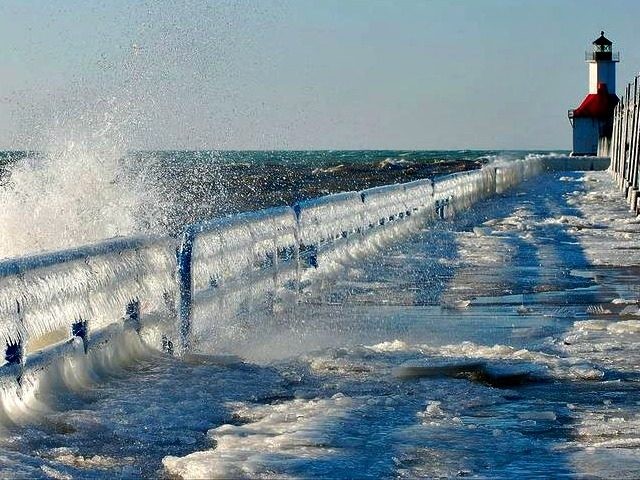Between 2010 and 2013 residents of the states surrounding the Great Lakes were told that climate change was permanently altering their environment and the record low water levels being recorded in the lakes may be the new normal. But now, only three years later, news reports are worried about beach erosion because the lakes have rebounded to record high levels of water.
This week, throughout the Chicago media landscape, as well as in reports in Michigan and Wisconsin, stories about a loss of swimming areas on public beaches are filling airwaves and newspaper pages. Residents and city officials are warning citizens that water levels in Lake Michigan and the other lakes are so high that the shallow swimming areas have been reduced as the water rises. Reports are also express worry over beach erosion and fears that the rising water is a danger to other infrastructure like roads.
In Chicago, DNAInfro.com, for instance, notes that water levels have risen a whopping four feet since 2013 and the new water is “swallowing up beaches.”
According to the Army Corps of Engineers, the water has risen 15 inches higher than this time last year and may rise another six inches before the summer heat starts its cycle of evaporation.
The Chicago Tribune reports that the northern suburb of Evanston is losing beachfront property. “All our beaches are shrinking,” Evanston parks director Lawrence Hemingway said.
For its part, Chicago’s Fox affiliate worries that the city’s lakeshore bike path is being destroyed by the higher water levels.
The Detroit Free Press also noted that the high water is erasing beaches and the water is at highs not seen since the 1990s.
Lake Michigan, of course, isn’t the only lake rising. As a report from April about Lake Huron points out, all the lakes are rising.
But even as these news outlets are shocked and concerned about the record high levels of water filling the Great Lakes to overflowing today, only a few short years ago these same sort of news outlets were worried that the lakes were irreversibly shrinking and that climate change was desolating both commerce and the environment.
In 2013, for instance, Chicago’s Public Television WTTW bemoaned a “dramatic” change in the climate that was warming the lakes, lowering water levels, and threatening to destroy commerce and the environment.
The local PBS story also went national as the PBS Newshour ran stories on the environmental disaster the lakes were experiencing.
In 2012 National Geographic sonorously warned that the “climate-related trend” was on the verge of laying waste to the region.
Crain’s Detroit was also writing in 2013 that communities living on the edges of the region’s monumental bodies of water were going to have to “adapt” to the new normal of climate change.
Naturally, far left sources were absolutely sure that global warming was drying up the lakes. In 2013 far left website Think Progress worried its readers with claims that climate change was “damaging” the lakes and would present “implications for the environment and the economy.”
The Natural Resource Defense Council even contemplated lawsuits to prevent cities on the lakes from tapping into them as a source of water.
On the other hand, less alarmist stories noted that the water level was affected by things other than global warming. In 2013 USA Today properly noted that some of the water drop was a result of the massive dredging campaigns launched by the U.S. Army Corps of Engineers, a project meant to allow shipping and transportation to more easily ply the waters of the Great Lakes.
Still, it is amazing to see the difference in coverage. Today, with water levels hitting record highs, news reporters and city officials worry over their loss of beachfront property and not a word is mentioned of climate change. Yet only three years ago the same officials and news reporters were sure that climate change was here to stay and we’d better get used to the shrunken Great Lakes.
What a difference a few years makes.
Follow Warner Todd Huston on Twitter @warnerthuston or email the author at igcolonel@hotmail.com

COMMENTS
Please let us know if you're having issues with commenting.